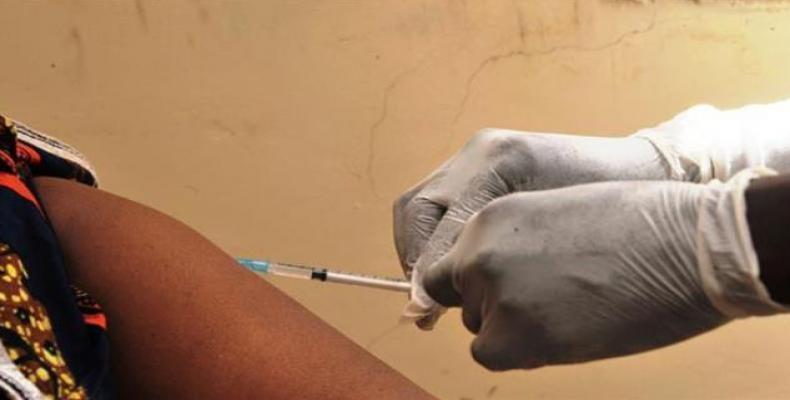Geneva, May 18 (RHC)-- The World Health Organization has sent the first 4,000 doses of an Ebola vaccine to Congo, the first time the experimental vaccine has been deployed since it was developed during the last big outbreak two years ago. The vaccine, developed by Merck, is still not licensed but proved effective during limited trials in West Africa in the biggest ever outbreak of Ebola, which killed 11,300 people in Guinea, Liberia and Sierra Leone from 2014 until 2016.
Health officials hope they can use it to contain the latest outbreak in Democratic Republic of Congo, which the WHO believes has so far killed 20 people since April. Health workers have recorded two confirmed cases, 22 probable cases and 17 suspected cases of Ebola in three health zones of Congo's Equateur province, and identified 432 people who may have had contact with the disease. The WHO said it had sent 300 body bags for safe burials in effected communities, a possible indication of how big it expects the outbreak to be.
The first batch of 4,000 doses of vaccine was already being flown to Kinshasa, and the WHO plans to send a second batch of 4,000 doses in coming days, WHO spokesman Tarik Jasarevic said. It will be reserved for people suspected of coming in contact with the disease. "In our experience, for each confirmed case of Ebola there are about 100-150 contacts and contacts of contacts eligible for vaccination," Jasarevic said. "So it means this first shipment would be probably enough for around 25-26 rings - each around one confirmed case."
The outbreak was first spotted in the Bikoro zone, which has 31 of the cases and 274 contacts. There have also been eight cases and 115 contacts in Iboko health zone. The WHO is worried about the disease reaching the city of Mbandaka with a population of about 1 million people, which would make the outbreak far harder to tackle. Two brothers in Mbandaka who recently stayed in Bikoro for funerals are probable cases, with samples awaiting laboratory confirmation.
The WHO report said 1,500 sets of personal protective equipment and an emergency sanitary kit sufficient for 10,000 people for three months were being put in place.
World Health Organization sends first doses of Ebola vaccine to Congo

Related Articles
Commentaries
MAKE A COMMENT
All fields requiredMore Views
- Venezuela's attorney general denounces Salvadoran president as the top leader of the Maras
- Washington sanctions UN expert Francesca Albanese for documenting Israeli genocidal aggression against Gaza
- Israel admits Iranian missiles damaged Netanyahu's Tel Aviv office
- Cuba reiterates commitment to social protection policies
- UN expert affirms Israeli torture of Palestinian prisoners is widespread and systematic

